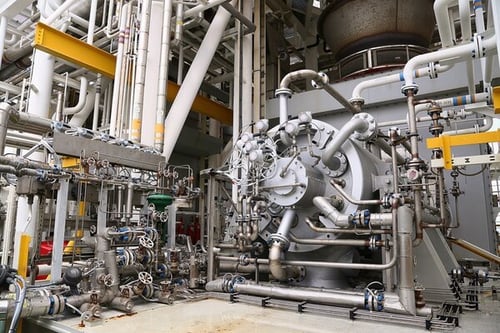Alloys vs. Superalloys (HPAs High Performance Alloys)
Alloys are metallic substances composed of two or more elements, as either a compound or a solution. The most common metal alloys in industrial applications are carbon steel and brass, an alloy of copper and zinc. However, special alloys are typically referred to as Superalloys or High Performance Alloys, which are made to withstand high temperatures, high stresses, and often highly oxidizing atmospheres with a resistance to corrosion or oxidation. Superalloys are nickel based with several key characteristics, including excellent mechanical strength, resistance to thermal creep deformation, and good surface stability. The development of superalloys has primarily been driven by the aerospace and power industries. Widely used superalloys are Hastelloy®, Inconel®, Invar ®, and Monel ®.
These corrosion-resistant superalloys are commonly used in extreme environments where tremendous heat and corrosion resistance is paramount to the integrity of the end product. Aerospace, petrochemical processing, chemical, power plants, and oil and gas industries use superalloys in many applications. As an example, they are used in the hottest sections of jet and rocket engines where temperatures reach 2192 – 2552°F (1200 – 1400 °C).
Superalloys in the World Market
The majority of demand for superalloys in 2016 was aerospace applications, representing 51.8 percent of the total, and is projected to remain fairly steady with 51.1 percent of the total market by 2023. The four largest application segments for these materials, representing 92.5 percent of the HPA market, are aerospace, industrial gas turbines (for power plants, etc.), general industrial, chemical processing and automotive.
Critical Super Alloy Applications
 Superalloys are used in very harsh environments. And their applications are critical to products we depend on, from the food we eat to the gas that powers our automobiles, to ships that transport many of raw materials and consumer goods.
Superalloys are used in very harsh environments. And their applications are critical to products we depend on, from the food we eat to the gas that powers our automobiles, to ships that transport many of raw materials and consumer goods.
Seawater and Marine
Many components such as fittings, valves, piping systems, trolling wire, and strainer baskets in seawater applications are made of Inconel, Monel or Hastelloy. Their comprehensive properties are used to manufacture many products used in marine applications and provide the excellent corrosion resistance and high mechanical strength required. These superalloys are often used in deep-sea mining, off-shore oil rigs and shipbuilding where seawater poses a constant threat of corrosion. One extreme application environment is north shore drilling. As an example, components used in oil drilling off the coast of Norway must follow NORSOK standards which are developed by the Norwegian petroleum industry to ensure adequate safety, value adding and cost effectiveness for petroleum industry developments and operations. Many component applications require 6Mo/254SMO. 6Mo/254SMO a super austenitic stainless steel with a minimum of 6% of molybdenum and a high level of nitrogen, providing high resistance to pitting (localized holes on the metal's surface) and crevice corrosion (the gap or crevice between two joining surfaces), combined with high strength.
Petrochemical and Chemical Processing
Fittings, valves, and tubing made of superalloys are used in many applications across these industries including most chemical and pharmaceutical processing equipment, gas compressors, thermal processing equipment, water and wastewater processing, as well as food processing. Chemical processing includes the manufacture of a broad range of products from insecticides to pharmaceuticals, as well as many industrial chemicals and petrochemical manufacturing. These applications can experience extremely harsh environments where components are continually exposed to corrosive chemicals. A crucial product used in petrochemical plants, chemical processing, oil and gas drilling and underground gas transfer is coiled tubing made of a superalloy. The materials are used for components in high temperature, high pressure, corrosive ambient environments and even carburizing in heat treatment processes. Coiled tubing comes in spools of up to 6000 feet (1830 km) and is ideal in applications from deep hole drilling and exploration, to transporting hydrogen over hundreds of feet, to running gasses and liquids throughout petrochemical plants.
Power Plants
Oil, coal, and natural gas are still the most important fuels for power generation around the world. HPAs are widely used for components in nuclear power plants, coal-fired power plants, diesel generators and wind turbines. Due to their high temperature resistance, high strength, corrosion resistance, and oxidation resistance HPAs are widely used in equipment such as:
- Heat exchanger within power boilers
- Gas turbine parts
- Steam turbines
- Gas turbines in power plants
- Heat exchangers
- Scrubbers
- Industrial furnaces and accessories
The most commonly used alloys for these applications are various grades of Inconel such as Inconel 600, 625 and 690, Inconel 718 and X-750, and Incoloy 800.
Power plant engineers and component designers use validated software tools to increase accuracy when forecasting the life expectancy of components subjected to high temperatures and significant cycling operations. This aids the designs of new high temperature components for use in existing power plants or in the design of new plants.
Aerospace
Though many components such as fittings, valves, and tubing in aerospace (from jets to spacecraft) are made from certain superalloys , the most significant use is in turbine engines.
Turbine engines generate a substantial amount of heat, reaching temperatures of more than 2,700°F (1,482°C). As in other industries, a standard base metal or alloy cannot provide adequate thermal protection against such extreme temperatures.
Though typical operating temperatures for long periods of time run from 1472 – 1832°F (800–1000°C). Superalloys are used in engine components such as high-pressure turbine blades, combustion chambers, afterburners, discs, and thrust reversers.
Probably the most common material used to manufacture turbine blades is Inconel alloys 600 and 601, which are also used in a variety of jet engine and airframe components, such as tubing, fittings, exhaust liners, lockwire and turbine seals.
Sources Include:
- AEETHER CO., LIMITED
- HandyTube
- Industrial Metal Service
- National Energy Technology Laboratory
- ScienceDirect
- Special Metals
- Wudenalloy


.png)